新概念英语第二册第20课_
(完整版)新概念英语第二册第20课课文讲解
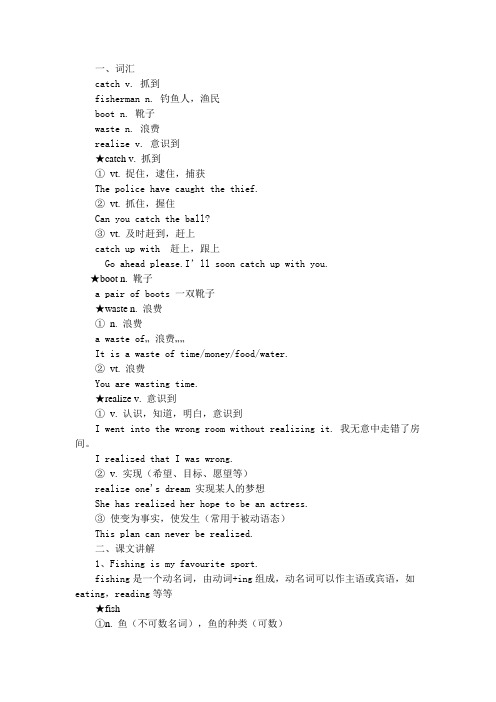
一、词汇catch v. 抓到fisherman n. 钓鱼人,渔民boot n. 靴子waste n. 浪费realize v. 意识到★catch v. 抓到①vt. 捉住,逮住,捕获The police have caught the thief.②vt. 抓住,握住Can you catch the ball?③vt. 及时赶到,赶上catch up with 赶上,跟上Go ahead please.I’ll soon catch up with you.★boot n. 靴子a pair of boots 一双靴子★waste n. 浪费①n. 浪费a waste of… 浪费……It is a waste of time/money/food/water.②vt. 浪费You are wasting time.★realize v. 意识到①v. 认识,知道,明白,意识到I went into the wrong room without realizing it. 我无意中走错了房间。
I realized that I was wrong.②v. 实现(希望、目标、愿望等)realize one's dream 实现某人的梦想She has realized her hope to be an actress.③使变为事实,使发生(常用于被动语态)This plan can never be realized.二、课文讲解1、Fishing is my favourite sport.fishing是一个动名词,由动词+ing组成,动名词可以作主语或宾语,如eating,reading等等★fish①n. 鱼(不可数名词),鱼的种类(可数)There are a lot of fishes(表示种类)in the sea.②v. 钓鱼, 捕鱼2、I often fish for hours without catching anything.for+时间表示一段时间for hours=for some hours 数小时without catching anything作为状语而出现, 表示结果状语。
新概念英语第二册第20课
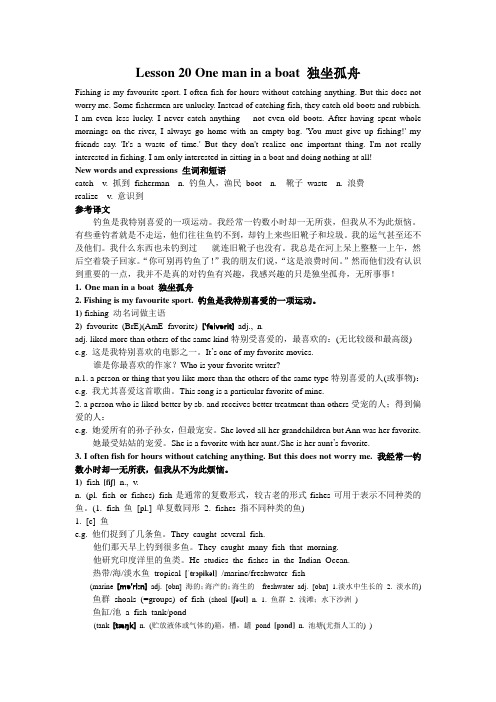
Lesson 20 One man in a boat 独坐孤舟Fishing is my favourite sport. I often fish for hours without catching anything. But this does not worry me. Some fishermen are unlucky. Instead of catching fish, they catch old boots and rubbish.I am even less lucky. I never catch anything -- not even old boots. After having spent whole mornings on the river, I always go home with an empty bag. 'You must give up fishing!' my friends say. 'It's a waste of time.' But they don't realize one important thing. I'm not really interested in fishing. I am only interested in sitting in a boat and doing nothing at all!New words and expressions 生词和短语catch v. 抓到fisherman n. 钓鱼人,渔民boot n. 靴子waste n. 浪费realize v. 意识到参考译文钓鱼是我特别喜爱的一项运动。
我经常一钓数小时却一无所获,但我从不为此烦恼。
有些垂钓者就是不走运,他们往往鱼钓不到,却钓上来些旧靴子和垃圾。
我的运气甚至还不及他们。
我什么东西也未钓到过-- 就连旧靴子也没有。
新概念二 第20课课件

第20课 One man in aboat 独坐孤舟
1.New words 2.text
3.grammer
New words and expressions
New words and expressions
• 1.catch (1.1) /kæ tf/ (caught /ko:t/, caught)v.抓到 • 2.waste(1.6)/werst/n.浪费 • 3.fisherman (l.2)/'fifəmen/n.钓鱼人,渔民 • 4.realize (1.7) /'rielaiz/v. 意识到 • 5.boot (1.3)/bu:t/n.靴子
课文注释
1.l often fish for hours without catching anything. 我经常一钓数小时却一无所获。 without 通常表示“缺乏”、“没有”: I can't repair the car without your help. 没有你的帮助我无法修理这车。 当它位于动名词前时,它表示“不曾”、“不”; They tried to leave the restaurant without paying 他们企图不付账就离开餐馆。
John left the room without telling anyone. 约翰离开房间时不曾告诉任何人。
课文注释
2.Instead of catching fish, they catch old boots and rubbish. 他们往往鱼钓不到,却钓上来些旧靴子和垃圾。 instead有“作为替代”、“反而”等含义,一般以短语形式instead of出现: Jack took part in the race instead of Tony 杰克代替托尼参加了比赛。
新概念英语第二册20课

●LESSON 201.生词与短语1)catch表示捉到的时候,还可以用:grab,seize,hold,take hold of等等Catch fish 钓鱼,捕鱼Catch thief 抓住小偷Catch the bus 赶公共汽车→miss the bus 错过公共汽车catch one’s attention Catch one’s eyesdraw one’s attention Draw one’s eyes }吸引某人注意力attract one’s attention Attract one’s eyescatch fire 燃烧,着火(强调动作)be on fire 燃烧着的,着火的(强调状态)Catch a cold 患感冒(强调动作)Have a cold 患感冒(强调状态)Catch sb. doing sth 抓住某人正在做某事Eg. The little boy was caught stealing apples from the garden.这个小男孩正在偷苹果被.抓住了。
Eg. The early bird catches the worms. 早起的鸟儿能捕到虫子。
(谚语的实际含义:捷足先登)【同义词区分】grab 抓起,抢夺,热切或拼命地抓snatch 抢夺,突然而迅速地抓起arrest (依法)逮捕capture 俘虏,捕获trap 设陷阱捕捉grasp 握紧,抓住seize 握紧,抓住catch it 被责骂,受处罚【口】(常与will等连用)Eg. If I come home late , I’ll catch it from my mother. 如果我回家晚了,妈妈会骂我的。
catch up with 赶上(某人)eg. Go ahead , please. I’ll soon catch up with you.Catch on (意见,时尚)受欢迎的Catch phrase 标语,引人注目的句子2)fishFish →fishman (pl. fishmen)Fish 鱼(c.)n..⑴fish 鱼(pl.)单复数头同形⑵fish 不同种类的鱼A big fish in a small pond. 一个小池塘里的大鱼(中文寓意:山中无老虎,猴子称霸王)Eg. When the cat is away, the mice will play.当猫不在的时候,老鼠就开始玩儿了。
(完整版)新概念英语第二册第20课课文讲解

一、词汇catch v. 抓到fisherman n. 钓鱼人,渔民boot n. 靴子waste n. 浪费realize v. 意识到★catch v. 抓到①vt. 捉住,逮住,捕获The police have caught the thief.②vt. 抓住,握住Can you catch the ball?③vt. 及时赶到,赶上catch up with 赶上,跟上Go ahead please.I’ll soon catch up with you.★boot n. 靴子a pair of boots 一双靴子★waste n. 浪费①n. 浪费a waste of… 浪费……It is a waste of time/money/food/water.②vt. 浪费You are wasting time.★realize v. 意识到①v. 认识,知道,明白,意识到I went into the wrong room without realizing it. 我无意中走错了房间。
I realized that I was wrong.②v. 实现(希望、目标、愿望等)realize one's dream 实现某人的梦想She has realized her hope to be an actress.③使变为事实,使发生(常用于被动语态)This plan can never be realized.二、课文讲解1、Fishing is my favourite sport.fishing是一个动名词,由动词+ing组成,动名词可以作主语或宾语,如eating,reading等等★fish①n. 鱼(不可数名词),鱼的种类(可数)There are a lot of fishes(表示种类)in the sea.②v. 钓鱼, 捕鱼2、I often fish for hours without catching anything.for+时间表示一段时间for hours=for some hours 数小时without catching anything作为状语而出现, 表示结果状语。
逐句精讲新概念英语第二册第20课独坐孤舟

逐句精讲新概念英语第二册第20课独坐孤舟逐句精讲新概念英语第二册:第20课独坐孤舟Lesson20 One man in a boat课文内容:Fishing is my favourite sport. I often fish for hours without catching anything. But this does not worry me. Some fishermen are unlucky. Instead of catching fish, they catch old boots and rubbish.I am even less lucky. I never catch anything-not even old boots.After having spent whole mornings on the river, I always go home with an empty bag. ‘You must give up fishing!' my friends say.‘It's a waste of time.' But they don't realize one important thing. I'm not really interested in fishing. I am only interested in sitting in a boat and doing nothing at all !本文语法:动名词语法归纳:动名词由“V + ing”构成,是兼有动词和名词一部分性质的非谓语动词,可以通俗地理解为表达动词的含义而具有名词的词性。
动名词在句子中可充当主语、宾语、表语、定语等:1)动名词作主语:Saving is having.节约就是财富。
Finding a good job is very difficult now.现在找一个好工作很难。
【新概念英语青少版第二册】第011-020课的文本及翻译

【新概念英语青少版第二册】第011-020课的文本及翻译第11课: Father hangs a picture 爸爸挂图第12课: Professor Boffin's umbrella 伯菲教授的雨伞第13课: It sounds terrible? 听上去真可怕第14课: A funny cake 一块滑稽的蛋糕第15课: Mother meets Mr May 妈妈见到了梅先生第16课: Sandy has a bad cold 桑迪得重感冒了第17课: Sandy's medicine 桑迪的药第18课: No parking 不准停车第19课: Pour it over yourself 你自己倒第20课:Haircut or shave? 理发还是修面Lesson 11 Father hangs a picture第11课爸爸挂图Father: I'm going to hang this picture here.我想把这幅画挂在这儿。
Sue: Can I help you,dad?爸爸,要我帮你吗?Father: Yes,Sue.好的,苏。
I need a piece of chalk.I want to put a mark on the wall. 我要一支粉笔,我想在墙上作个记号。
Father: Now I need a hammer and some nails.现在我需要一把锤子和几个钉子。
Sue: Here you are,dad.爸爸,给你。
Sue: Be careful,dad!Don't hit your fingers.爸爸,小心点,别砸着手指。
Father: Ouch! My fingers!哎哟!我的手指!Sandy: What's the matter with dad,Sue?爸爸怎么了?Sue: He's all right,but he needs some sticking-plaster!没什么,但他要点橡皮膏。
新概念英语第二册Lesson20Onemaninaboat课文讲义

新概念英语第二册第20课Lesson 20: One man in a boat 独坐孤舟Fishing is my favourite sport. I often fish for hours without catching anything. But this does not worry me. Some fishermen are unlucky. Instead of catching fish, they catch old boots and rubbish. I am even less lucky. I never catch anything -- not even old boots. After having spent whole mornings on the river, I always go home with an empty bag. 'You must give up fishing!' my friends say. 'It's a waste of time.' But they don't realize one important thing. I'm not really interested in fishing. I am only interested in sitting in a boat and doing nothing at all! New words and expressions 生词和短语catch v. 抓到(caught, caught)fisherman n. 钓鱼人,渔民boot n. 靴子waste n. 浪费realize v. 意识到参考译文钓鱼是我特别喜爱的一项运动。
我经常一钓数小时却一无所获,但我从不为此烦恼。
有些垂钓者就是不走运,他们往往鱼钓不到,却钓上来些旧靴子和垃圾。
新概念英语第二册课件Lesson20(共36页)-2

注:动名词作主语与不定式作主语的区别:
动名词作主语通常表示抽象的或泛指的动作,一般不与特定的 动作执行者联系在一起;不定式作主语通常表示具体的动作或行为, 往往与特定的动作执行者联系在一起,如:
realize one's hope/dream/plan He realized his dream at last. →His dream was realized at last. come true 成为现实 (物作主语,无被动语态)
What’s your hobby?
answer the questions
★ boot n. 靴子
a pair of boots running shoes 跑鞋 tennis shoes 网球鞋 leather shoes 皮鞋 sandles 凉鞋 sneakers 轻便运动鞋 (Am.) slipper 拖鞋
★ waste vt./n. 浪费
waste 1) vt.浪费
work. 14.A lot of men have given up _w__e_ar_i_n_g__(wear) hats. 15.She is very interested in _d_a_n_c_in_g__ (dance). 16.On _e_n_te_r_i_n_g (enter) the room, he turned on the light.
This story is less interesting than that one. not so/as ...as 不及,不如 I am not so happy as before. This story is not so interesting as that one.
新概念二第20课习题答案

新概念二第20课习题答案新概念二第20课习题答案在学习英语的过程中,习题是非常重要的一部分。
通过做习题,我们能够巩固所学的知识,提高语言运用能力。
而《新概念英语》是一套经典的英语教材,其中的习题也是我们学习的重要资源。
本文将为大家提供《新概念英语》第二册第20课的习题答案,希望能够帮助大家更好地学习和掌握英语。
第一题:选择题1. B2. C3. A4. B5. C6. A7. B8. C9. A10. B第二题:填空题1. at2. in3. on4. in5. in6. on7. at8. in9. on10. in第三题:改错题1. He is a friend of mine. (去掉the)2. He is a student at a university. (去掉the)3. He is a doctor in a hospital. (去掉the)4. She is a teacher in a school. (去掉the)5. He is a writer of books. (去掉the)6. She is a member of a club. (去掉the)7. He is a member of a team. (去掉the)8. She is a member of a family. (去掉the)第四题:翻译题1. 我们在一家饭店里吃饭。
2. 他们在一家咖啡厅里喝咖啡。
3. 我们在一家电影院里看电影。
4. 他们在一家商店里购物。
5. 我们在一家医院里看病。
通过以上习题的答案,我们可以对自己的学习情况进行检验和总结。
同时,通过分析和理解习题的解答过程,我们也能够更好地掌握相关的语法知识和词汇用法。
在学习英语的过程中,习题是一个非常重要的辅助工具,可以帮助我们提高语言运用能力和解决实际交流中的问题。
除了做习题,我们还可以通过其他方式来提高英语水平。
比如,多读英语原版书籍,观看英语电影和纪录片,参加英语角或者英语俱乐部等等。
新概念英语第二册课后习题答案全

新概念英语第二册课后习题答案全一、练习册第1课至第10课课后习题答案1. Lesson 1: A Private ConversationAnswer Key:1. Yes, he did.2. He asked the woman to change her seat.3. She replied that she was in the middle.2. Lesson 2: Breakfast or Lunch?Answer Key:1. He wanted to buy a newspaper.2. He ordered breakfast.3. He thought it was too early for lunch.3. Lesson 3: Please Send Me a CardAnswer Key:1. He was in a small village.2. He sent a telegram to his wife.3. He was in a hospital.4. Lesson 4: An Exciting TripAnswer Key:1. They were in a bus.2. They were going to a village.3. They had a wonderful trip.5. Lesson 5: No Wrong Numbers1. He was waiting for a phone call.2. He was waiting for his uncle.3. He received a wrong number.6. Lesson 6: Percy ButtonsAnswer Key:1. He was an old man.2. He collected old coins.3. He had a valuable coin.7. Lesson 7: Too LateAnswer Key:1. They were late for the meeting.2. They missed the train.3. They had to take a taxi.8. Lesson 8: The Best and the WorstAnswer Key:1. He was a good swimmer.2. He was the best swimmer in the pool.3. He was the worst swimmer in the pool. Answer Key:1. He was a famous actor.2. He was in a small town.3. He was recognized a young man.10. Lesson 10: Not for Jazz1. He was a famous musician.2. He played the piano.3. He was not for jazz.二、练习册第11课至第20课课后习题答案11. Lesson 11: One Good Turn Deserves Another Answer Key:1. He helped an old lady.2. She helped him find his way.3. He was grateful to her.12. Lesson 12: Ask Me No QuestionsAnswer Key:1. He was a writer.2. He wrote a book about his adventures.3. He was very modest.13. Lesson 13: Going on HolidayAnswer Key:1. They were going on holiday.2. They were going to the seaside.3. They had a wonderful time.14. Lesson 14: Do You Speak English?Answer Key:1. He was a tourist.2. He was in a foreign country.3. He spoke English.15. Lesson 15: Good NewsAnswer Key:1. He was a doctor.2. He had good news for his patient.3. The patient was cured.16. Lesson 16: A Polite RequestAnswer Key:1. He was a customer.2. He wanted to buy a new car.3. He asked the salesman for help.17. Lesson 17: Across the ChannelAnswer Key:1. He was a swimmer.2. He swam across the English Channel.3. He was very tired.18. Lesson 18: Once a WeekAnswer Key:1. He was a doctor.2. He visited his patients once a week.3. He was very busy.19. Lesson 19: Sold OutAnswer Key:1. He was a customer.2. He wanted to buy a ticket.3. The ticket was sold out.20. Lesson 20: One Man in a BoatAnswer Key:1. He was a fisherman.2. He was alone in a boat.3. He caught a lot of fish.。
最新裕兴新概念英语第二册笔记打印版-第20课
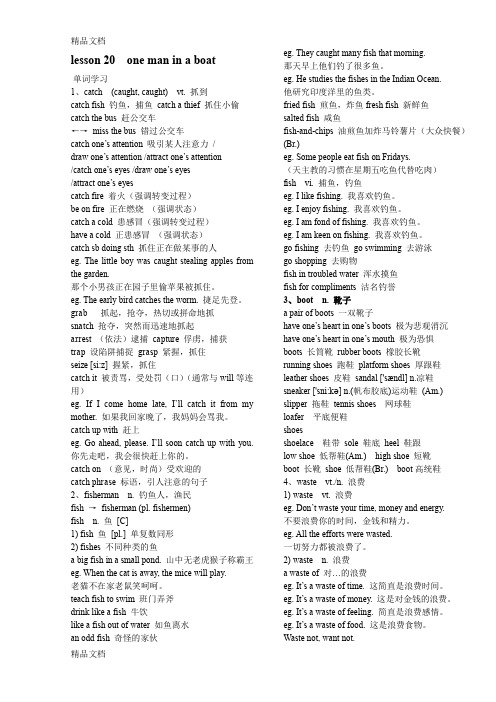
lesson 20 one man in a boat单词学习1、catch (caught, caught) vt. 抓到catch fish 钓鱼,捕鱼catch a thief 抓住小偷catch the bus 赶公交车←→miss the bus 错过公交车catch one’s attention 吸引某人注意力/draw one’s attention/attract one’s attention/catch one’s eyes/draw one’s eyes/attract one’s eyescatch fire 着火(强调转变过程)be on fire 正在燃烧(强调状态)catch a cold 患感冒(强调转变过程)have a cold 正患感冒(强调状态)catch sb doing sth 抓住正在做某事的人eg. The little boy was caught stealing apples from the garden.那个小男孩正在园子里偷苹果被抓住。
eg. The early bird catches the worm. 捷足先登。
grab抓起,抢夺,热切或拼命地抓snatch抢夺,突然而迅速地抓起arrest(依法)逮捕capture俘虏,捕获trap设陷阱捕捉grasp紧握,抓住seize [si:z] 握紧,抓住catch it被责骂,受处罚(口)(通常与will等连用)eg. If I come home late, I’ll catch it from my mother. 如果我回家晚了,我妈妈会骂我。
catch up with赶上eg. Go ah ead, please. I’ll soon catch up with you. 你先走吧,我会很快赶上你的。
catch on(意见,时尚)受欢迎的catch phrase标语,引人注意的句子2、fisherman n. 钓鱼人,渔民fish →fisherman (pl. fishermen)fish n. 鱼[C]1) fish 鱼[pl.] 单复数同形2) fishes 不同种类的鱼a big fish in a small pond. 山中无老虎猴子称霸王eg. When the cat is away, the mice will play.老猫不在家老鼠笑呵呵。
新概念英语第二册课后练习答案(1-20)
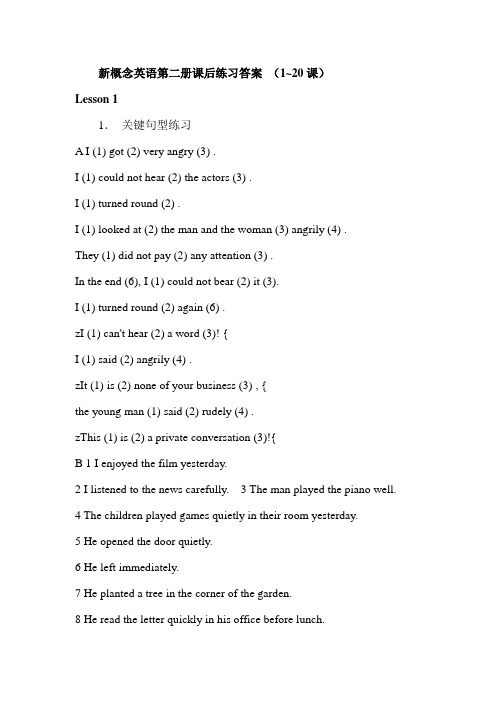
新概念英语第二册课后练习答案(1~20课)Lesson 11.关键句型练习A I (1) got (2) very angry (3) .I (1) could not hear (2) the actors (3) .I (1) turned round (2) .I (1) looked at (2) the man and the woman (3) angrily (4) .They (1) did not pay (2) any attention (3) .In the end (6), I (1) could not bear (2) it (3).I (1) turned round (2) again (6) .zI (1) can't hear (2) a word (3)! {I (1) said (2) angrily (4) .zIt (1) is (2) none of your business (3) , {the young man (1) said (2) rudely (4) .zThis (1) is (2) a private conversation (3)!{B 1 I enjoyed the film yesterday.2 I listened to the news carefully.3 The man played the piano well.4 The children played games quietly in their room yesterday.5 He opened the door quietly.6 He left immediately.7 He planted a tree in the corner of the garden.8 He read the letter quickly in his office before lunch.9 I borrowed a book from the library this morning.10 The cook spoilt the soup.11 We stay at home on Sundays.12 There are a lot of people at the bus stop.13 The little boy ate greedily an apple in the kitchen this morning.14 She draws beautifully.15 I like music very much.16 They built a new school in our village last year.17 The match ended at four o'clock.18 She received a letter from her brother last week.2.多项选择题答案1 b2 c3 b4 d5 c6 a7 d 8 b 9 a 10 c 11 c 12 cLesson 22.难点练习答案1 What a wonderful garden(this is) !2 What a surprise( this is) !3 What a lot of trouble he is causing!4 What wonderful actors (they are) !5 What a hard-working woman (she is) !6 What a tall building (it is) !7 What a terrible film (it is) !8 What a clever boy you are!9 What a pretty girl (she is) !10 What a strange guy (he is) !3.多项选择题答案1 c2 d3 c4 c5 a6 b7 b 8 a 9 d 10 c 11d 12 bLesson 31.关键句型练习题A went (1.1)Õvisited (1.2) Õsat(1.2) Õtaught(1.2)ÕlentÕread(1.3) Õdid notunderstandÕthought (1.4)Õpassed (1.5) Õdid not send(1.5) ÕmadeÕ go up (1.6) Õbought (1.7) Õspent(1.7) Õdid not write(1.8)C ...Roy died last year…left me…spent a lotof money…bought one or two…never went to the cinema…stayed at home…listened tomusic…often lent CDs…they kept them…lost many CDs…2.难点练习题1 He paid some money to the shopkeeper.2 He handed the prize to me.3 The waiter brought the man a bottle ofbeer.4 He sold me all his books.5 The shop assistant found me some curtain material.6 He did a big favour for me.7 She showed her new hat to her husband.8 She promised the finder a reward.9 He gave some advice to his son.10 His uncle left some money to/ for him.11 He is teaching us English.12 I bought you this bunch of flowers.13 Bring me that book please.14 He offered a cigarette to me.15 Read the first paragraph to me.16 I've ordered you some soup.17 I owe a lot of money to him.18 Pass your father the mustard.3.多项选择1c 2a 3c 4a 5d 6b7c 8c 9b 10a 11b 12bLesson 121.关键句型练习答案A will sail (1.1); shall meet (1.2); will be (1.3); will set out (11.4-5); shall have(1.5); shallsee (1.5); shall say (1.6);will be (1.6); will take part (1.7)C I shall go to the theatre Reg and I shall see the firstperformance the producer will give a short speech. He will speak to The play will bevery people will enjoy it very much.2.难点练习答案1 He is not back yet. He will be back in ten minutes.2 A new play is on at the Globe Theatre.3 When the concert was over, We went home.4 They will set out/ off very early tomorrow morning. (Here be off is also possible.)5 You can't take the exam yet. You are not up to it.6 He will be away from home for two months.7 She swam across the English Channel and set up a new world record. 3.多项选择题答案1 c2 c3 a4 d5 d6 a7 d 8 a 9 c 10 d 11 a 12 aLesson 131.关键句型练习答案A will be arriving (1.2); will be coming (1.3); will be meeting (1.4); will be singing (1.5);will be staying (1.6); will be trying (1.8)C 1 I'll be ironing the clothes.2 The train will be arriving in a few minutes.3 We'll be seeing you in the morning.4 We'll be watching the match.5 He'll be correcting exercise books.2.难点练习答案1 It's George's.2 It's Jean's.3 It's that woman's.4 I like Keats' poetry best.5 They're the children's.6 They're the soldiers'.7 I'll leave in six hours time. 8 There was a hundred pounds' worth of damage.3多线选择答案1 b2 d3 b4 c5 a6 b7 b 8 c 9 a 10 a 11a 12 dLesson 141.关键句型练习答案A 1 I drove on to the next town after I had left a small village.2 I said good morning to him in French as soon as he had got into the car.3 I had nearly reached the town, when the young man said:BDo you speak English?C 1 After she had written the letter, she went to the post office.2 After he had had dinner, he went to the cinema.3 When I had fastened my seat belt, the plane took off.4 We did not disturb him until he had finished work.5 As soon as he had left the room, I turned on the radio.6 He had been very ill before he died.D 1 regretted 2 had begun/ began 3 arrived2.难点练习答案1 Except for2 both of3 Apart from4 askedlask for5 neither oflasked3.多项选择答案1 b2 c3 a4 c5 d6 b7 c 8 b 9 c 10 b 11 b 12 bLesson 151. 关键句型练习答案A 1a The secretary told me that Mr. Harmsworth would see me.bcMr. Harmsworth will see you. d2 a Mr. Harmsworth said that business was very bad.b cBusiness is very bad.d3 a Mr. Harmsworth told me that the firm could not afford to pay such large salaries.b cThe firm cannot afford to pay such large salaries. dB 1 told would come/would be coming2 said (had) cut3 told had never played4 did he say had done/would do5 did he tell (had) bought/would buy6 said could not7 said (had) worked8 told wrote/writes/had never written9 did you say were/had been10 said would wait2.难点练习答案1 study2 office3 nervous4 afford5 irritable3.多线选择答案1d 2b 3c 4b 5c 6d7a 8d 9c 10c 11c 12bLesson 201关键句型练习答案A Fishing(1.1); catching(11.1-2); catching(1. 3); having spent(1.5); fishing(1.6);fishingˆ sitting(1.8); doing (1.9) C 1 he went out of the restaurant without paying the bill.2 She bought a pair of boots instead of getting a pair of shoes.3 She was afraid of spending the night alone.4 After hearing/having heard the news, she fainted.5 Think carefully before answering my question.6 On seeing the plane coming towards me, I dashed for cover.2难点练习答案1realized 2It'sˆunderstandˆits 3exciting 4interesting 5excit ing 6interested3多项选择答案1b 2c 3b 4b 5c 6b新概念英语第二册课后习题答案详解Lesson 21练习答案 Key to written exercises 1.关键句型练习答案A …passing planes can be heard(1.2); The airport was built (1.2); it could not be used then(1. 3); a hun dred people must have been driven away(11.4-5); this house will be knocked down by a passing pl ane(11.6-7); I have been offered a large sum of money(1.7)C 1 A message will be sent immediately. 2 All these goods must be sold.3 I told you the parcel would be received in time.4 The letter has to be delivered by hand.5 Your l etter must have been lost In the post. 2.难点练习答案 A (sample answers)The dog drove the sheep out of the field. The police drove the crowds back. I drove my car into th e garage. B1 home 2 houses 3 house 4 home 3.多项选择题答案1. c根据课文第3-4行Last year, however, it came into use, 只有c. came into use recently 比较接近课文的实际内容,而其他3个选择都不符课文内容。
《新概念英语》第二册 电子版
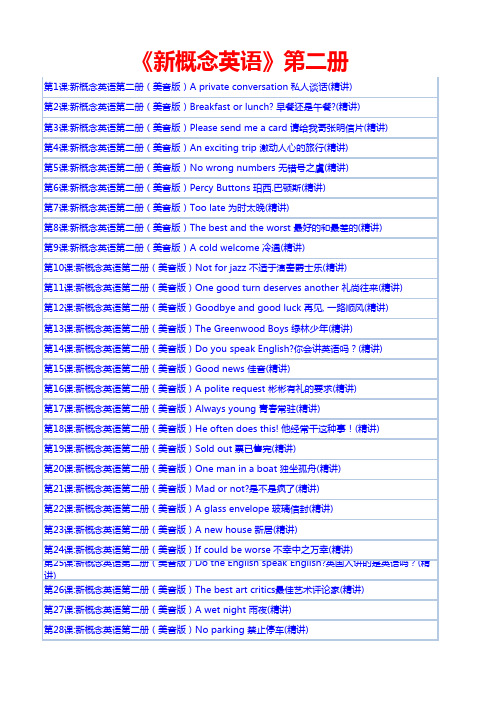
《新概念英语》第二册第1课:新概念英语第二册(美音版)A private conversation 私人谈话(精讲)第2课:新概念英语第二册(美音版)Breakfast or lunch? 早餐还是午餐?(精讲)第3课:新概念英语第二册(美音版)Please send me a card 请给我寄张明信片(精讲)第4课:新概念英语第二册(美音版)An exciting trip 激动人心的旅行(精讲)第5课:新概念英语第二册(美音版)No wrong numbers 无错号之虞(精讲)第6课:新概念英语第二册(美音版)Percy Buttons 珀西.巴顿斯(精讲)第7课:新概念英语第二册(美音版)Too late 为时太晚(精讲)第8课:新概念英语第二册(美音版)The best and the worst 最好的和最差的(精讲)第9课:新概念英语第二册(美音版)A cold welcome 冷遇(精讲)第10课:新概念英语第二册(美音版)Not for jazz 不适于演奏爵士乐(精讲)第11课:新概念英语第二册(美音版)One good turn deserves another 礼尚往来(精讲)第12课:新概念英语第二册(美音版)Goodbye and good luck 再见, 一路顺风(精讲)第13课:新概念英语第二册(美音版)The Greenwood Boys 绿林少年(精讲)第14课:新概念英语第二册(美音版)Do you speak English?你会讲英语吗?(精讲)第15课:新概念英语第二册(美音版)Good news 佳音(精讲)第16课:新概念英语第二册(美音版)A polite request 彬彬有礼的要求(精讲)第17课:新概念英语第二册(美音版)Always young 青春常驻(精讲)第18课:新概念英语第二册(美音版)He often does this! 他经常干这种事!(精讲)第19课:新概念英语第二册(美音版)Sold out 票已售完(精讲)第20课:新概念英语第二册(美音版)One man in a boat 独坐孤舟(精讲)第21课:新概念英语第二册(美音版)Mad or not?是不是疯了(精讲)第22课:新概念英语第二册(美音版)A glass envelope 玻璃信封(精讲)第23课:新概念英语第二册(美音版)A new house 新居(精讲)第24课:新概念英语第二册(美音版)If could be worse 不幸中之万幸(精讲)第25课:新概念英语第二册(美音版)Do the English speak English?英国人讲的是英语吗?(精讲)第26课:新概念英语第二册(美音版)The best art critics最佳艺术评论家(精讲)第27课:新概念英语第二册(美音版)A wet night 雨夜(精讲)第28课:新概念英语第二册(美音版)No parking 禁止停车(精讲)第29课:新概念英语第二册(美音版)Taxi! 出租汽车(精讲)第30课:新概念英语第二册(美音版)Football or polo? 足球还是水球?(精讲)第31课:新概念英语第二册(美音版)Success story 成功者的故事(精讲)第32课:新概念英语第二册(美音版)Shopping made easy 购物变得很方便(精讲)第33课:新概念英语第二册(美音版)Out of the darkness 冲出黑暗(精讲)第34课:新概念英语第二册(美音版)Quick work 破案 “神速”(精讲)第35课:新概念英语第二册(美音版)Stop thief!捉贼!(精讲)第36课:新概念英语第二册(美音版)Across the Channel 横渡海峡(精讲)第37课:新概念英语第二册(美音版)The Olympic Games 奥林匹克运动会(精讲)第38课:新概念英语第二册(美音版)Everything except the weather 唯独没有考虑到天气(精讲第39课:新概念英语第二册(美音版)Am I all right? 我是否痊愈?(精讲)第40课:新概念英语第二册(美音版)Food and talk 进餐与交谈(精讲)第41课:新概念英语第二册(美音版)Do you call that a hat? 你把那个叫帽子吗?(精讲)第42课:新概念英语第二册(美音版)Not very musical 并非很懂音乐(精讲)第43课:新概念英语第二册(美音版)Over the South Pole 飞越南极(精讲)第44课:新概念英语第二册(美音版)Through the forest 穿过森林(精讲)第45课:新概念英语第二册(美音版)A clear conscience 问心无愧(精讲)第46课:新概念英语第二册(美音版)Expensive and uncomfortable 既昂贵又受罪(精讲)第47课:新概念英语第二册(美音版)A thirsty ghost 嗜酒的鬼魂(精讲)第48课:新概念英语第二册(美音版)Did you want to tell me something? 你想对我说什么吗?第49课:新概念英语第二册(美音版)The end of a dream 美梦告终(精讲)第50课:新概念英语第二册(美音版)Taken for a ride 乘车兜风(精讲)第51课:新概念英语第二册(美音版)Reward for virtue 对美德的奖赏(精讲)第52课:新概念英语第二册(美音版)A pretty carpet 漂亮的地毯(精讲)第53课:新概念英语第二册(美音版)Hot snake 触电的蛇(精讲)第54课:新概念英语第二册(美音版)Sticky fingers 粘糊的手指(精讲)第55课:新概念英语第二册(美音版)Not a gold mine 并非金矿(精讲)第56课:新概念英语第二册(美音版)Faster than sound! 比声音还快!(讲解)第57课:新概念英语第二册(美音版)Can I help you, madam? 您要买什么,夫人?(精讲)第58课:新概念英语第二册(美音版)A blessing in disguise? 是因祸得福吗?(精讲)第59课:新概念英语第二册(美音版)In or out? 进来还是出去?(精讲)第60课:新概念英语第二册(美音版)The future 卜算未来(精讲)第61课:新概念英语第二册(美音版)Trouble with the Hubble 哈勃望远镜的困境(讲解)第62课:新概念英语第二册(美音版)After the fire 大火之后(精讲)第63课:新概念英语第二册(美音版)She was not amused 她并不觉得好笑(精讲)第64课:新概念英语第二册(美音版)The Channel Tunnel 海峡隧道(精讲)第65课:新概念英语第二册(美音版)Jumbo versus the police 小象对警察(精讲)第66课:新概念英语第二册(美音版)Sweet as honey! 像蜜一样甜!(精讲)第67课:新概念英语第二册(美音版)Volcanoes 火山(精讲)第68课:新概念英语第二册(美音版)Persistent 纠缠不休(精讲)第69课:新概念英语第二册(美音版)But not murder!并非谋杀!(精讲)第70课:新概念英语第二册(美音版)Red for danger 危险的红色(精讲)第71课:新概念英语第二册(美音版)A famous clock第72课:新概念英语第二册(美音版)A car called bluebird第73课:新概念英语第二册(美音版)The record-holder第74课:新概念英语第二册(美音版)Out of the limelight第75课:新概念英语第二册(美音版)SOS第76课:新概念英语第二册(美音版)April Fools Day第77课:新概念英语第二册(美音版)A successful operation第78课:新概念英语第二册(美音版)The last one?第79课:新概念英语第二册(美音版)By air第80课:新概念英语第二册(美音版)The Crystal Palace第81课:新概念英语第二册(美音版)Escape第82课:新概念英语第二册(美音版)Monster or fish?第83课:新概念英语第二册(美音版)After the elections第84课:新概念英语第二册(美音版)On strike第85课:新概念英语第二册(美音版)Never too old to learn第86课:新概念英语第二册(美音版)Out of control第87课:新概念英语第二册(美音版)A perfect alibi第88课:新概念英语第二册(美音版)Trapped in a mine第89课:新概念英语第二册(美音版)A slip of the tongue 第90课:新概念英语第二册(美音版)What第91课:新概念英语第二册(美音版)Three men in a basket 第92课:新概念英语第二册(美音版)Asking for trouble第93课:新概念英语第二册(美音版)A noble gift第94课:新概念英语第二册(美音版)Future champions第95课:新概念英语第二册(美音版)A fantasy第96课:新概念英语第二册(美音版)The dead return。
新概念英语第二册第20课课件.ppt

• After having spent whole mornings on the river, I always go home with an empty bag. 'You must give up fishing!' my friends say.' It's a waste of time.' But they don't realize one important thing. I'm not really interested in fishing. I am only interested in sitting in a boat and doing nothing at all !
• 废纸箱
• 5. realize (v.) ☺意识到
• realize sth.
• realize one’s mistake
• I realize my mistake at last.
• realize that…
• e.g. He realized that he was wrong.
•
☺实现
• give up doing • 放弃… • ' It's a waste of time.‘
• a waste of time
• But they don't realize one important thing.
• I'm not really interested in fishing.
old boots. • not even • 甚至连…都没有
• After having spent whole mornings on the river, I always go home with an empty bag.
新概念英语2第20课课文
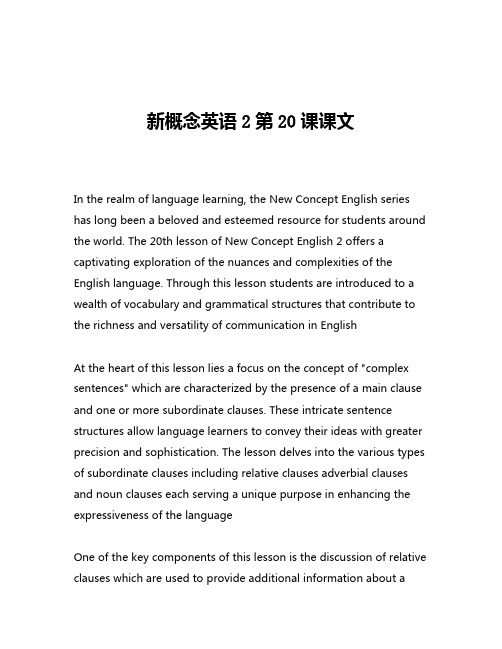
新概念英语2第20课课文In the realm of language learning, the New Concept English series has long been a beloved and esteemed resource for students around the world. The 20th lesson of New Concept English 2 offers a captivating exploration of the nuances and complexities of the English language. Through this lesson students are introduced to a wealth of vocabulary and grammatical structures that contribute to the richness and versatility of communication in EnglishAt the heart of this lesson lies a focus on the concept of "complex sentences" which are characterized by the presence of a main clause and one or more subordinate clauses. These intricate sentence structures allow language learners to convey their ideas with greater precision and sophistication. The lesson delves into the various types of subordinate clauses including relative clauses adverbial clauses and noun clauses each serving a unique purpose in enhancing the expressiveness of the languageOne of the key components of this lesson is the discussion of relative clauses which are used to provide additional information about anoun or pronoun in a sentence. Students are introduced to the distinction between restrictive and non-restrictive relative clauses and learn how to effectively incorporate them into their writing and speech. The lesson emphasizes the importance of using relative pronouns such as who which and that to seamlessly integrate these clauses and create cohesive and well-structured sentencesIn addition to relative clauses the 20th lesson of New Concept English 2 also explores adverbial clauses. These subordinate clauses serve to modify the verb or provide additional information about the action expressed in the main clause. Learners are exposed to various types of adverbial clauses including those of time place reason condition and contrast gaining a deeper understanding of how to use them to enhance the clarity and nuance of their languageFurthermore the lesson delves into the realm of noun clauses which function as subjects objects or complements within a sentence. Students are guided through the process of constructing noun clauses using conjunctions such as that whether and if and learn how to employ them effectively to convey complex ideas and abstract conceptsThroughout the lesson numerous examples and practice exercises are provided to reinforce the understanding of these grammatical structures. Learners are encouraged to engage actively with thematerial by analyzing sample sentences identifying the different types of clauses and experimenting with incorporating complex sentences into their own written and spoken EnglishBeyond the technical aspects of grammar the 20th lesson of New Concept English 2 also emphasizes the importance of developing a diverse and sophisticated vocabulary. Students are introduced to a wealth of new words and expressions that can be utilized to elevate their language and communicate more effectively. The lesson highlights the significance of context in understanding and applying these vocabulary items ensuring that learners can seamlessly integrate them into their everyday speech and writingOne of the key strengths of this lesson lies in its ability to strike a balance between theoretical knowledge and practical application. While delving into the intricacies of complex sentence structures and grammatical concepts the lesson also provides ample opportunities for learners to put their newfound understanding into practice. Through a variety of engaging activities and exercises students are able to apply the principles they have learned and hone their skills in crafting complex yet coherent sentencesMoreover the lesson encourages learners to think critically about the nuances of the English language and how the strategic use of complex sentences can enhance their overall communication skills.By developing a deeper appreciation for the richness and versatility of the language students are empowered to express themselves with greater clarity precision and sophisticationIn conclusion the 20th lesson of New Concept English 2 is a truly remarkable resource for language learners seeking to elevate their mastery of the English language. Through its comprehensive coverage of complex sentence structures diversification of vocabulary and emphasis on practical application this lesson equips students with the necessary tools to communicate with confidence and clarity in a wide range of personal and professional contexts. As learners embark on this exciting journey of linguistic exploration they are sure to emerge with a newfound appreciation for the power and beauty of the English language。
新概念英语二册新版20课练习题

新概念英语二册新版20课练习题新概念英语第二册是一套广受欢迎的英语教材,它通过各种情景对话和练习题来提高学习者的英语听说读写能力。
以下是针对新概念英语二册第20课的一些练习题,旨在帮助学生巩固课文内容并提高语言运用能力。
1. 词汇练习:- 列出本课中出现的所有新词汇,并给出它们的中文意思。
- 用这些新词汇造句。
2. 语法练习:- 找出本课中使用的所有时态,并举例说明它们的用法。
- 改写课文中的句子,将它们转换成不同的时态。
3. 听力练习:- 听录音,回答关于课文内容的问题。
- 听一段对话,然后填空完成对话中缺失的部分。
4. 口语练习:- 与同伴一起练习课文中的对话。
- 描述一个与课文主题相似的情景,并与同伴进行角色扮演。
5. 阅读理解:- 阅读课文并回答下列问题:- 文章的主要观点是什么?- 作者通过哪些例子来支持他/她的观点?- 阅读一篇与课文主题相关的短文,并总结其主要信息。
6. 写作练习:- 写一篇短文,描述你最近遇到的一个困难,并解释你是如何解决它的。
- 根据课文内容,写一封给朋友的信,分享你从课文中学到的东西。
7. 翻译练习:- 将课文中的几个句子从英文翻译成中文。
- 将一些中文句子翻译成英文,确保它们与课文的主题相关。
8. 综合应用:- 假设你正在计划一次旅行,写一份行程安排,包括你打算参观的地方和你希望进行的活动。
- 选择课文中的一个角色,写一篇日记,从这个角色的视角描述一天的生活。
请注意,这些练习题旨在帮助学生全面提高英语能力,包括词汇、语法、听力、口语、阅读、写作和翻译等方面。
教师可以根据学生的具体情况调整练习的难度和类型。
逐句精讲新概念英语第二册第20课 独坐孤舟
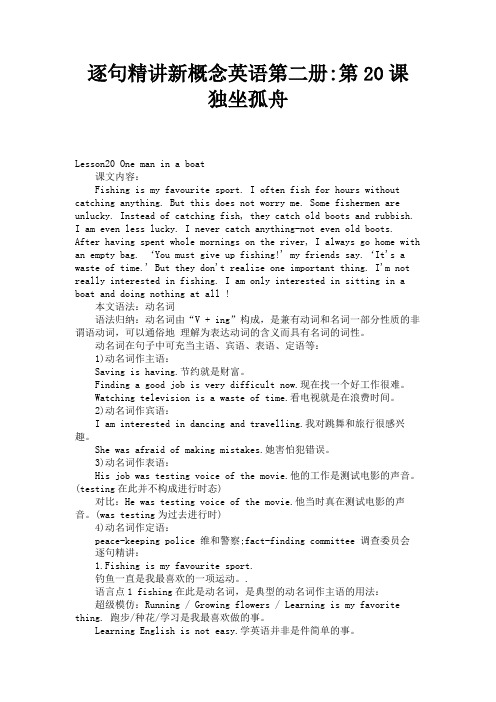
逐句精讲新概念英语第二册:第20课独坐孤舟Lesson20 One man in a boat课文内容:Fishing is my favourite sport. I often fish for hours without catching anything. But this does not worry me. Some fishermen are unlucky. Instead of catching fish, they catch old boots and rubbish.I am even less lucky. I never catch anything-not even old boots.After having spent whole mornings on the river, I always go home with an empty bag. ‘You must give up fishing!' my friends say.‘It's a waste of time.' But they don't realize one important thing. I'm not really interested in fishing. I am only interested in sitting in a boat and doing nothing at all !本文语法:动名词语法归纳:动名词由“V + ing”构成,是兼有动词和名词一部分性质的非谓语动词,可以通俗地理解为表达动词的含义而具有名词的词性。
动名词在句子中可充当主语、宾语、表语、定语等:1)动名词作主语:Saving is having.节约就是财富。
Finding a good job is very difficult now.现在找一个好工作很难。
新概念英语第二册学生用书Lesson20

3 Aftef having spent whole mornings on the river,在河上呆了整整一个上午之后。由 于作介词after的宾语的动名词所表示的动作发生在谓语动词go之前,因此,动名词要用完成 ce02s20.htm
2013-1-17
Watching television is my favourite pastime. 看电视是我最喜爱的业馀爱好。 Reading in bed is something I always enjoy. 我总喜欢躺在床上看书 b 动名词作宾语 I am very keen on cycling. 我非常喜欢骑自行车。 She is afraid of staying in that house alone. 她害怕单独住在那间屋子里。 He is capable of doing anything. 他能胜任任何事情。
Summary writing 摘要写作
Answer these questions in not more than 50 words. 回答下列问题,将答案组成一个段落,不要超过50个单词。 1 What is the writer's favourite sport? 2 What do some unlucky fishermen catch? 3 Is the writer as lucky as they are, or is he not so lucky? 4 Does he ever catch anything? 5 Is he really interested in fishing? 6 What is the only thing that interests him?
- 1、下载文档前请自行甄别文档内容的完整性,平台不提供额外的编辑、内容补充、找答案等附加服务。
- 2、"仅部分预览"的文档,不可在线预览部分如存在完整性等问题,可反馈申请退款(可完整预览的文档不适用该条件!)。
- 3、如文档侵犯您的权益,请联系客服反馈,我们会尽快为您处理(人工客服工作时间:9:00-18:30)。
only _i_n_t_e_r_e_s_te_d__ in sitting in a boat and doing nothing at all!
1.What is your favourite pastime?
如果没有你的话,我们的计划就无法成功了。
2.Instead of catching fish, they catch old boots and rubbish.
prep. 代替, 而不是 ...
①作为短语介词,instead of 后面常跟名词、代词和动名词,
偶尔也跟复合结构
I made this cake specially, with brown sugar instead of white.
catch anything -- not even old boots. After
having __s_p_e_n_t__ whole mornings on the river, I always go home with an _e_m__p_t_y_ bag. 'You must _g_i_v_e_ u__p fishing!' my friends say. 'It's a _w_a_s_t_e_ of time.' But they don't __re_a_l_i_z_e_ one important
3.After having spent whole morning on the river, I always go home with an empty bag.
不定式和动名词都可以作主语、宾语、表语、定语和补语
作主语和表语时,动名词形式表示一般的、概念性的、时常的 动作,而动词不定式常表示一时的、偶然的行为和动作。如:
(2)
wish, hope, promise, expect, pretend, want, agree, refuse, prepare, manage, persuade, afford, offer, attempt, decide等。
只跟不定式的习语:would like/love to等。
然而他们没有认识到重要的一点, 我并不是真的对钓鱼有兴趣,我感 兴趣的只是独坐孤舟,无所事事!
After having spent whole mornings on the river, I always go home with an empty bag..'
我总是在河上呆上整整一上午, 然后空着袋子回家。
⑥用于虚拟语气
without有时可表示条件,引出虚拟语气,与but for大致同 义。如
Without [But for] appropriate software, a computer would be a mere box.
如果没有恰当的软件,电脑只是一个空盒子罢了 Without [But for] you, our project wouldn’t have succeeded.
我没有咖啡了,喝茶行吗? 坐汽车得好几天时间,所以我们还是改乘飞机吧。 It will take days by car, so let’s fly instead.
她成天打网球,而不是学习。 She never studies. Instead, she plays tennis all d. ay
②(用在no, not, never等否定副词之后,强调肯定)没有……不
,没有……则不能……,每……必定……。如
The old man cannot walk without a stick. 那位老先生离开手杖就走不了路。
③(与-ing形式连用)不,无,没。如:
She entered the room without knocking. 她没敲门就进了房间。 我要是不懂得一点那个国家的语言,就不想到to a country without knowing something of
5.Why is fishing the writer’s favourite sport?
He likes sitting in a boat and doing nothing at all.
【课文讲解】
1. I often fish for hours without catching anything. ①. (表否定)没有,无,不需。如:
Being a doctor is a good choice.
当医生是不错的选择。(对任何人、任何时候而言都是这样) To be a good doctor is my dream.
(1)只可使用动名词作宾语的动词
enjoy, miss,practice, prefer, suggest, consider, appreciate, avoid, mind, imagine, finish, admit, deny, delay, risk
3. What does the writer catch?
He catches nothing.(always goes home with an empty bag).
4. What is his friends’ suggestion?
They ask me to give up fishing: “It’s a waste of time.”
I am even less lucky. I never catch anything—not even old boots.
我的运气甚至还不及他们。 我什么东西也未钓到过—就 连旧靴子也没有。
Fishing is my _f_a_v_o_u_r_i_te_ sport. I often
fish for hours withoutc_a_t_c_h_in__ganything. But this does not _w__o_r_r_y_ me. Some _f_i_s_h_e_r_m_e_n__ are _u_n_l_u_c_k_y. _I_n_s_te_a_d_ of catching fish, they catch old boots and _ru__b_b_i_s_h. I am even less lucky. I never
(3)既可接动名词,又可接不定式作宾语的动词有: start, begin, continue, like, love, hate等,意思基本没有 love,like和hate接动名词和不定式时,表示长久的、规律 性的好恶用动名词,表示一时的、个别性的好恶常用不定式。
只跟动名词的短语:feel like, stick to, devote to, pay attention to, be worth, be busy, can’t help, it is no use, be used to (习惯于), look forward to, can’t stand
The letter was posted without a stamp. 那封信没贴邮票就寄出去了。 我们到了那儿,一路上没遇到任何麻烦。 We got there without any trouble . 雨天外出不带伞会淋湿的。 You’ll get wet if you go out in the rain without an umbr.ella
3.Are you good at it? How?
4.The importance of having a pastime? 5、Do you think the writer is wasting his time? Why or Why not?\ 6、Do you think the writer would like to work as a fisherman? Would you? Why or Why not?
Questions on the text: 1. What does the writer often do?
He often fishes for hours without catching anything.
2.What do some fishermen catch?
They catch old boots and rubbish.
他提议做些工作而不是看电视。(连接不定式)
In warm weather he often reads under a tree instead of in the library. (连接介词短语)
③Instead 单独使用的时候式副词,常用于句末。例如: We’ve no coffee. Would you like tea instead.
我经常一钓数小时却一无所获, 但我从不为此烦恼。
Some fishermen are unlucky. Instead of catching fish, they catch old boots and rubbish.
有些垂钓者就是不走运,他 们往往鱼钓不到,却钓上来 旧靴子和垃圾。
But they don’t realize one important thing. I’m not really interested in fishing. I am only interested in sitting in a boat and doing nothing at all!
the language.
④without+宾语+动名词 无人注意,他从窗户溜了出去。 Without anyone noticin, hge slipped through the window. ⑤ without+宾语+过去分词 Without another word exchanged, they started off. 没有再交谈一句,他们就出发了。
